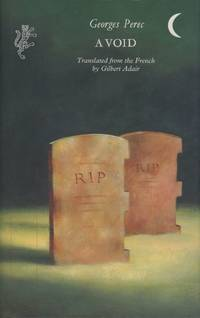A Void, by Georges Perec, translated from the French by Gilbert Adair
So, I don’t know if you’ve heard of this book, Perec’s A Void.

Let me just show you the beginning first. Here we go:
Incurably insomniac, Anton Vowl turns on a light. According to his watch it’s only 12.20. With a loud and languorous sigh Vowl sits up, stuffs a pillow at his back, draws his quilt up around his chin, picks up his whodunit, and idly scans a paragraph or two; but, judging its plot impossibly difficult to follow in his condition, its vocabulary to whimsically multisyllabic for comfort, throws it away in disgust.
Padding into his bathroom, Vowl dabs at his brow and throat with a damp cloth.
It’s a soft, warm night and his blood is racking through his body. An indistinct murmur wafts up to his third-floor flat. Far off, a church clock starts chiming – a chiming as mournful as a last post, as an air-raid alarm, as an SOS signal from a sinking ship. And, in his own vicinity, a faint lapping sound informs him that a small craft is at that instant navigating a narrow channel.
Crawling across his windowsill is a tiny animal, indigo and saffron in colour, not a cockroach, not a blowfly, but a kind of wasp, laboriously dragging a sugar crumb along with it. Hoping to crush it with a casual blow, Vowl lifts up his right hand; but it abruptly flaps its wings, flying off without giving its assailant an opportunity to do it any harm.
Notice anything? If you didn’t already know the trick here, then I bet you didn’t. This book is widely and believably reputed to be the best novel ever written without using the letter E. Even more stunningly, the guy who translated it also did so without using the letter E. The book, incidentally, comes with a little plastic packet filled with tiny paper cutout letters E and a little note that as the book is damaged, the buyer may find these useful.
This is just astonishing – I mean, that anyone wrote a novel-length work without using the letter E in the first place, even in French, but it’s even more astonishing that anyone tackled the job of translating into English while also holding onto that restriction. It’s a stunt, obviously, but it’s a really impressive stunt. And you know what makes it even more astonishing? That in the middle of this novel, the author includes, and the translator translates, the following:
William Shakspar’s “Living or Not Living” soliloquy
PBS’s “Ozymandias”
John Milton’s “On His Glaucoma”
Thomas Hood’s “No”
Arthur Gordon Pym’s “Black Bird”
Arthur Rimbaud’s “Vocalisations”
***
Let’s take a look at a couple you may recognize:
Ozymandias
I know a pilgrim from a distant land
Who said: Two vast and sawn-off limbs of quartz
Stand on an arid plain. Not far, in sand,
Half sunk, I found a facial stump, drawn warts
And all; its curling lips of cold command
Show that its sculptor passions could portray
Which still outlast, stamp’d on unliving things,
A mocking hand that no constraint would sway:
And on its plinth this lordly boast is shown:
“Lo, I am Ozymandias, king of kings:
Look on my works, O Mighty, and bow down!”
‘Tis all that is intact. Around that crust
Of a colossal ruin, now windblow,
A sandstorm swirls and grinds it into dust.
What do you think? Obviously it’s terrible compared to the original, but it’s clever, isn’t it? The quartz/warts thing is truly dreadful.
I wonder if it might be a fun assignment in a lit class, to ask students to produce a version of this poem using various constraints, but trying to stay as close to the original in rhyme, rhythm, and meaning as possible. They’d all have to look up “visage,” I expect, and also spend a moment thinking about what the poem means, which could only be beneficial.
Okay, next!
***
The Black Bird
‘Twas upon a midnight tristful I sat poring, wan and wistful
Through many a quaint and curious list full of my consorts slain –
I sat nodding, almost napping, till I caught a sound of tapping,
As of spirits softly rapping, rapping at my door in vain –
“’Tis a visitor,” I murmur’d, “tapping at my door in vain –
Tapping soft as falling rain.”
…. …. ….
Now, that night-wing’d fowl placating my sad fancy into waiting
On its oddly fascinating air of arrogant disdain,
“Though thy tuft is shorn and awkward, thou,” I said, “art not so backward
Coming forward, ghastly Black Bird wand’ring far from thy domain,
Not to say what thou art known as in thy own dusk-down domain!”
Quoth that Black Bird, “Not again.”
***
Obviously I just pulled out a couple of stanzas here; the whole thing has been parodied in the novel. It’s amazing how the rhyme, rhythm, and wordplay has been captured not just presumably by the e-less version in French, but again by this translated version. I’d be really interested in the French version – whether it has anything of the feel of the original.
Please Feel Free to Share:






The post A Void, by Georges Perec, translated from the French by Gilbert Adair appeared first on Rachel Neumeier.
 newest »
newest »
 I wonder what he had against the letter E? lol. It must have taken forever to write!
I wonder what he had against the letter E? lol. It must have taken forever to write!



